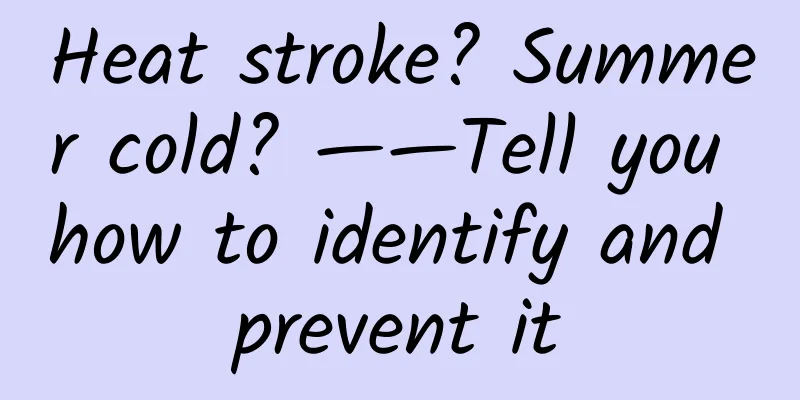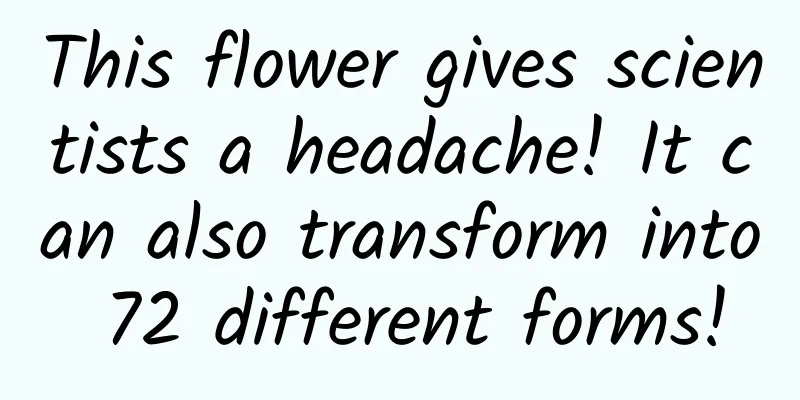Heat stroke? Summer cold? ——Tell you how to identify and prevent it

|
This is the 4402nd article of Da Yi Xiao Hu "The catkins of the crabapple tree have all flown away, and the days are getting longer." We bid farewell to the spring with blooming flowers and flying catkins, and usher in the summer with scorching sun and shady trees. In the hot summer, with the gradual increase in temperature and the increase in the frequency of high-temperature days under extreme meteorological conditions, many people will experience symptoms such as dizziness, headache, fever, sweating, fatigue and poor appetite. Does it seem like heatstroke? Or is it a bit like a cold? Both are common emergencies in summer. How to distinguish between the two? What preventive measures can be taken for each? Let us help you with some tips. 1. Identify heat stroke and summer colds 1. Differentiate the cause Heat stroke usually occurs after being in a high temperature (above 32°C) or high humidity (above 60%), poorly ventilated environment or clothing conditions for a long time. The human body undergoes a series of changes in the process of maintaining normal body temperature, causing discomfort reactions (increased evaporation leading to increased sweating, accelerated circulation causing palpitations and headaches, peripheral vasodilation causing skin flushing, reduced visceral blood flow to reduce basal metabolism leading to decreased digestion and other functions, excessive electrolyte loss causing muscle cramps, or excessive water loss causing circulatory failure, etc.), and even serious neurological symptoms and systemic multi-system failure due to severe imbalance in body temperature regulation and sweat gland failure. The occurrence of summer colds is essentially the same as that of colds in other seasons. The main cause is wind and cold. In summer, it is often caused by setting the indoor air conditioning temperature too low for the sake of coolness, or blowing cold air directly at the air conditioning outlet (or fan). It is also often caused by frequent entry and exit of indoor and outdoor environments with large temperature differences in a short period of time, and being caught in the rain. However, it is worth noting that the common characteristics of patients with heatstroke or summer colds are that they often have some underlying chronic diseases, or recent overwork, irregular diet and work and rest, which can easily lead to a decline in the body's regulatory ability and immune function. 2. Differentiate symptoms Most patients with heat stroke usually first experience symptoms such as excessive sweating, thirst, headache, dizziness, fatigue, palpitations, nausea, and loss of appetite. They usually do not experience aversion to wind, fear of cold, or chills. Due to excessive sweating, the fever is not obvious, and sometimes a low fever occurs. However, if it is not treated in time, the condition continues to worsen or heat stroke occurs, and high fever and impaired consciousness may occur. At this time, due to severe disorder of body temperature regulation and failure of sweat gland function, there is no sweating. If fever symptoms occur during a summer cold, they often first experience aversion to wind and fear of cold, and the body temperature may be low or high, and are often accompanied by dizziness, headache, muscle aches, etc.; generally no sweating or a small amount of sweating in the early stage; the most common symptoms are sneezing, nasal congestion, runny nose, itchy throat, sore throat, coughing, sputum, etc.; sometimes accompanied by symptoms of digestive disorders such as nausea, vomiting, and diarrhea. II. Response and Prevention 1. Heat stroke: (1) Emergency treatment : When suspected heatstroke occurs, leave the high temperature environment promptly and move to a cool and well-ventilated area. If you are wearing work clothes or hats with poor breathability, take them off as soon as possible. Wipe the whole body with warm water to help dissipate heat by evaporation. If the patient's body temperature is high, place ice packs on the back of the head, armpits, or groin to cool down. However, be careful not to use ice water to wipe the whole body in general to avoid contraction of peripheral blood vessels and sweat glands that affect heat dissipation. Rehydrate in a timely manner. Patients who sweat a lot should first drink beverages containing a certain amount of electrolytes such as sodium and potassium, or take special oral rehydration salts. If the patient has severe symptoms such as repeated muscle cramps, persistent high fever, impaired consciousness, no sweating, and oliguria, he or she should be sent to a doctor promptly. (2) Prevention : Avoid staying in high temperature, high humidity and poorly ventilated environments for a long time, especially for people with underlying diseases, obese people, the elderly, pregnant women and children; outdoor sports or physical labor should be done away from direct sunlight and high temperature periods; clothing should be made of natural fiber materials as much as possible to facilitate ventilation and heat dissipation; pay attention to timely replenishment of water and electrolytes. The daily water intake of a normal adult should reach more than 1500 ml, and the amount should be increased in summer according to the temperature and sweating situation; you can choose mint, chrysanthemum, lotus leaf, dandelion, ophiopogon, black plum, Pseudostellaria chinensis and other Chinese medicines to decoct or soak in water instead of tea, which can clear away heat and relieve summer heat, and replenish qi and promote salivation; in summer, you can choose appropriate amounts of mung beans, cucumbers, watermelons, bitter melons, winter melons and other ingredients in your daily diet to help cool down and relieve summer heat. 2. Summer cold (1) Home response : Rational use of over-the-counter antipyretic and analgesic drugs: For patients with nasal congestion, runny nose, headache, and obvious muscle aches all over the body, compound preparations can be selected, such as compound acetaminophen tablets and phenacetin tablets; for patients with high fever (such as body temperature above 38.5°C), single preparations can be selected, such as acetaminophen tablets, ibuprofen tablets, indomethacin suppositories, etc.; it should be noted that only one antipyretic and analgesic drug can be used, and it is strictly forbidden to use two or more drugs in combination or use them in excess of the dose; over-the-counter Chinese medicine preparations for dispelling wind and relieving exterior symptoms can be selected, such as Zheng Chaihu Granules and Shufeng Jiedu Capsules; when accompanied by gastrointestinal symptoms, over-the-counter drugs such as Huoxiang Zhengqi Liquid, Xianglian Tablets, and Montmorillonite Powder can be selected accordingly; if oral medications are taken for more than 3 days and the symptoms do not improve or continue to worsen, medical attention should be sought promptly. (2) Prevention : After sweating profusely or getting caught in the rain, dry your body and change clothes promptly, and avoid being blown directly by air conditioners or fans. The indoor air conditioner temperature should not be set too low to avoid a large temperature difference between indoor and outdoor. Ensure air circulation in the indoor environment, open windows for ventilation at least twice a day for more than half an hour each time. Add or remove clothes promptly when the temperature changes drastically. Avoid greed for coolness in the summer, and do not consume too much cold drinks or cold food. Exercise moderately and get enough sleep to improve the body's immunity. Tips To prevent heatstroke and colds in summer, the common principles are to combine work and rest, have a proper schedule and diet, maintain a calm mood, receive standardized treatment and control underlying diseases. Author: Shuguang Hospital Affiliated to Shanghai University of Traditional Chinese Medicine Emergency Department Dr. Cai Jingwen |
>>: How terrible is the blind spot of the vehicle? The driver didn't see any of the 75 children!
Recommend
"Facial paralysis caused by air conditioning?" Doctors remind: The truth is...
As summer approaches, the temperature is getting ...
Data analysis from the perspective of product operation
What is Data Analytics? Data analysis is a goal, ...
How much does a Arabian horse cost? How much does a French Arabian BMW cost?
How much does a Arabian horse cost? Normally, the...
iOS upgrades stagnate, app crash rates slowly decrease
According to the weekly report released by Testin...
The underlying logic and detailed design of the sharing of gift fission gameplay
Since the transformation to operation, we have be...
4 reasons why Microsoft Surface is doomed
The technology website Computerworld recently rep...
Influenza is prevalent in autumn and winter. How to distinguish between COVID-19, the common cold and influenza?
On November 5, at the press conference of the Joi...
I thought it was hemorrhoids, but it turned out to be colon cancer! I was delayed by this common "little thing"... It's not too late to know now
Recently there is a hot search about cancer: #Doc...
New features of iOS 9 to be announced at WWDC 2015
After two years of excitement, it's time to f...
China Academy of Information and Communications Technology: New Energy Vehicle Industry Operation Data in May 2022
In May, the resumption of work and production in ...
Android unit testing - several important issues
[[173976]] Original link: http://www.jianshu.com/...
Traffic monetization optimization skills practical chapter
This article focuses on the three most popular AP...
How to relieve dry throat and sore throat? Is drinking more water enough?
Author: Zhao Xiaochang, attending physician, Beij...









